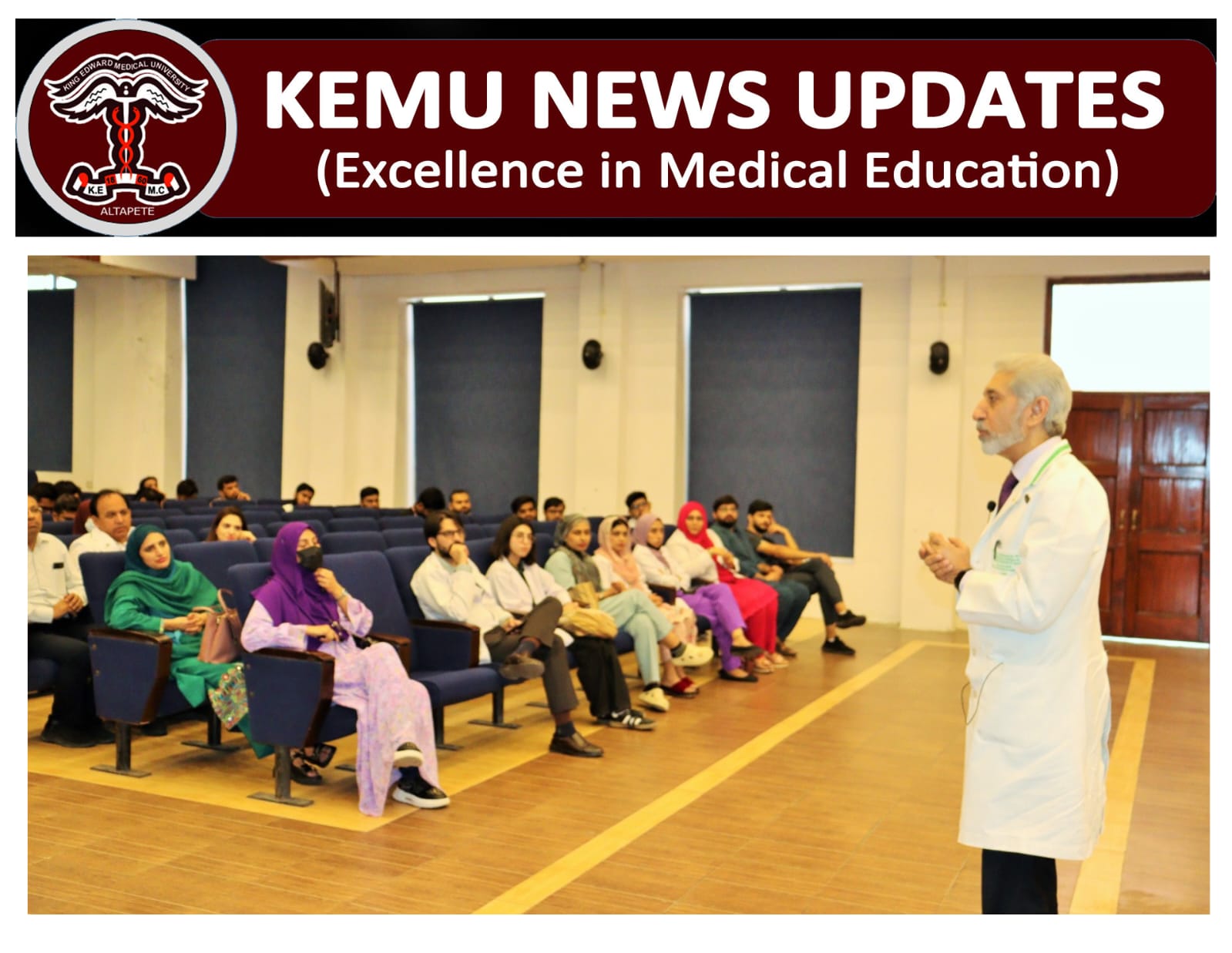
A Clinico-Pathological Conference (CPC) was held at King Edward Medical University (KEMU), Lahore, for the Final Year MBBS students of the 2024–2025 session. The event took place on Friday, October 3, 2025, at Jinnah Auditorium and was attended by students, faculty members, and distinguished experts from multiple departments.
The academic gathering featured three significant and challenging case studies, designed to enhance students’ understanding of diagnosis, treatment, and the complexities of clinical medicine.
𝐂𝐚𝐬𝐞 𝐬𝐭𝐮𝐝𝐲-𝟏: 𝐁𝐞𝐲𝐨𝐧𝐝 𝐭𝐡𝐞 𝐎𝐛𝐯𝐢𝐨𝐮𝐬: 𝐂𝐮𝐫𝐢𝐨𝐮𝐬 𝐂𝐚𝐬𝐞 𝐨𝐟 𝐐𝐮𝐚𝐝𝐫𝐢𝐩𝐚𝐫𝐞𝐬𝐢𝐬
Under the esteemed supervision of Prof. Dr. Muhammad Imran, Chairman, Department of Medicine, the case presented by Dr. Tuba Riaz, Postgraduate Resident.
The patient, under treatment for tuberculosis for the past eight months, presented with an inability to move all four limbs for three days. Interestingly, neurological examination was unremarkable, adding complexity to the case.
During the discussion, Dr. Tuba Riaz During the discussion, Dr. Tuba Riaz addressed pertinent clinical questions such as: After initiating IV potassium replacement, what should be the next step? What are the possible causes of hypokalemia in this patient? She also analyzed the pathological reports and emphasized the importance of distinguishing between metabolic, neurological, and systemic causes.
This case emphasized that diagnosing Quadriparesis a rare and complex condition requires sharp clinical reasoning, critical thinking, and a scientific approach.
𝐂𝐚𝐝𝐞 𝐬𝐭𝐮𝐝𝐲-𝟐: 𝐒𝐡𝐨𝐫𝐭 𝐁𝐨𝐰𝐞𝐥 𝐒𝐲𝐧𝐝𝐫𝐨𝐦𝐞: 𝐀 𝐁𝐚𝐭𝐭𝐥𝐞 𝐀𝐠𝐚𝐢𝐧𝐬𝐭 𝐭𝐡𝐞 𝐈𝐧𝐞𝐯𝐢𝐭𝐚𝐛𝐥𝐞
This case was led by Prof. Dr. Abrar Ashraf Ali, Professor of Surgery (South Medical) and Director Medical Education, along with his team from the South Surgical Ward, including Dr. Fatima Sajid and Dr. Anayza Fatima Shahid (PGRs).
A 32-year-old male presented with abdominal pain (7 days), vomiting (4 days), and constipation (2 days). His diagnostic workup included pre-operative X-rays, exploratory laparotomy, histopathology, post-operative evaluation, and CT angiography.
Dr. Fatima Sajid detailed the patient’s history and investigations, while Dr. Anayza Fatima Shahid discussed the post-operative findings, underlying causes, complications, and management strategies.
The case highlighted the formidable challenges of Short Bowel Syndrome and underscored the importance of nutritional support, timely surgical intervention, and multidisciplinary long-term care.
𝐂𝐚𝐬𝐞 𝐬𝐭𝐮𝐝𝐲 -𝟑: 𝐒𝐨𝐟𝐭 𝐓𝐢𝐬𝐬𝐮𝐞 𝐒𝐚𝐫𝐜𝐨𝐦𝐚
Under the supervision of Prof. Dr. Muhammad Mustahsan Bashir, Chairman, Department of Plastic Surgery, Dr. Iqra Nosheen (PGR) presented a rare and complex case of Soft Tissue Sarcoma.
Prof. Dr. Mustehsan Bashir emphasized:
Delayed diagnosis of soft tissue sarcoma often complicates treatment outcomes. Radiology must always precede biopsy to ensure timely and accurate diagnosis. Treatment requires a multidisciplinary approach—oncological surgery, reconstructive plastic surgery, chemotherapy, and radiotherapy. The ultimate goal is not only aesthetic reconstruction, but more importantly, saving the patient’s life and preserving the functional integrity of the affected limb. Depending on the tumor’s size and location, skin grafts or flap surgeries are often the reconstructive options of choice.
The Vice Chancellor KEMU Prof. Dr. Mahmood Ayyaz highlighted that cases such as Quadriparesis, Short Bowel Syndrome, and Soft Tissue Sarcoma remind us that medicine is not merely treatment but a process of inquiry and discovery. He noted that disease can be compared to a hidden crime, requiring the same level of evidence, reasoning, and deduction to reach a precise diagnosis.
A surgeon can never truly become an excellent surgeon without first being a thorough physician, for the foundation of good surgery rests on sound clinical judgment. At KEMU, we take pride in nurturing this holistic approach to medical education. It is this philosophy that has enabled KEMU to remain Pakistan’s No. 1 medical institution for three consecutive years, with our graduates securing 112 successful matches in competitive USA residency programs.
He concluded by affirming that such academic sessions sharpen clinical reasoning, promote interdisciplinary collaboration, and instill compassion, competence, and leadership in future physicians.
𝐂𝐨𝐧𝐜𝐥𝐮𝐬𝐢𝐨𝐧:
The CPC concluded with a strong emphasis on the value of clinical-academic initiatives that go beyond theoretical learning. By exposing students to real-life patient challenges, advanced diagnostics, and multidisciplinary collaboration, these conferences cultivate scientific curiosity, critical thinking, and a spirit of inquiry qualities essential for the healthcare leaders of tomorrow.
